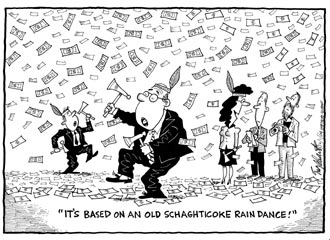The Indian Gaming and Regulatory Act of 1988: A Well Intended Law Gone Awry
By Jim Marino
Gaming vs. Gambling
I'd say Congress is reasonably clear on "what is an Indian tribe." The BIA has a procedure to recognize potential tribes and Congress usually goes with its determination. This recognition process has been in place for decades--long before gaming and the Indian Gaming Regulatory Act (IGRA) were factors.
Anyone can claim to be Indian?
Once a tribe is recognized, who cares how many people it has? Whether it has 50, 500, or 5,000 members, it has the same right to gaming as other tribes. The tribe's casino will earn the same amount and have the same community effects regardless of the tribe's size. The tribe's size is irrelevant.
With 800 members, the Mashantucket Pequots earn more from gaming than the Cherokee Nation with 300,000 members. And...so? Would Marino feel better if the Cherokees and Pequots switched casinos and income? How would that affect anyone except the members of the two tribes?
Would Marino really care if a tribe doubled its size? It would mean each member's receiving only half as much casino income. Would he care if the tribe halved its size and doubled its income per person instead? How would that be relevant to him or anyone outside the tribe?
Note that Marino never says hundreds of legitimate tribes are engaged in legitimate gaming along with a few "bad apples." He and his ilk never talk about Cherokee, Choctaw, Creek, Seminole, Navajo, Apache, Sioux, Cheyenne, Chippewa, Oneida, or Seneca casinos. It's all about how a few controversial cases invalidate the whole industry.
Apparently Marino has never met a gaming tribe he likes. Large gaming tribes are bad because they have too much economic power (see references to lobbying and Abramoff). Small gaming tribes are bad because they have too much economic power per person (see references to the Pequots and disenrollment). There's no "right" size for a gaming tribe to be.
In other words, all gaming tribes are bad, so let's shut down Indian gaming. According to Marino, the barbarians are at the gate. Indians are on the warpath again, so circle the wagons. The savages are threatening white power and privilege again.
Disenrollment: good or bad?
As he did in Too Many Indians, or Not Enough? Marino foolishly raises the disenrollment issue. Once again he's hypocritically trying to have it both ways. He complains that there are too many phony tribes with phony Indians in them, but he also complains when these tribes expel members, thus reducing their size.
Ironically, tribes that disenroll members often claim they're expelling people who aren't legitimate Indians. So they're doing exactly what Marino presumably wants: limiting gaming to "real" Indians. And yet he and other critics carp about it.
Which is it, dumbass: Do you want gaming tribes to keep questionable members or get rid of them? Would we be better off if these tribes were larger or smaller? Once again, are there too many Indians or not enough?
I love it when critics demonstrate their hatred for Indians and gaming. Marino doesn't have a rational position on whether disenrollment is good or bad. Or whether "phony Indians" are good or bad. All he's trying to do is tar-and-feather gaming with whatever charges will stick. "Gaming is somehow related to disenrollment and phony Indians, so gaming must be bad!" His "thinking" is literally that shallow and illogical.
We're a third of the way into Marino's column and he hasn't begun to address his title thesis--namely, how the Indian Gaming Regulatory Act went awry. Marino's screed against "phony" tribes and Indians have nothing to do with gaming in general or IGRA in particular. He's using gaming as a pretext to spew bigotry against Indians--to keep them "on the reservation" where they belong.
For more on the subject, see The Facts About Indian Gaming.
Below: Marino's view in a nutshell: No tribes are legitimate or have a legitimate right to gaming.


I believe you are stooping to Marino's crass argumentative style when you use name-calling (dumbass). Bob, I thought you were more intelligent than that. Please refrain from being so partial to the people who hire you for your columns you forget your place in the post and lean towards disdain without honor. Remember, "As one who should know, one should have known to understand before speaking or writing."
ReplyDelete